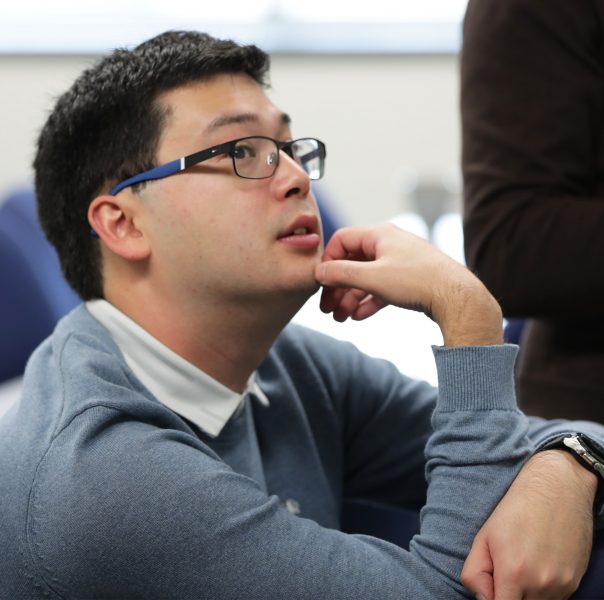
The Department of Computer Science is pleased to welcome Scott Pomerville, a research assistant professor. Pomerville received his PhD in computer science at Michigan Tech in spring 2024.
Pomerville’s research focuses primarily on computer architecture, but he says he’s always interested in chatting about anything computing related.
At one time computer architecture was a topic that Pomerville couldn’t really wrap his head around. “It just didn’t click with me,” he says. “But whether it’s because I’m curious, stubborn, or a combination of both, I ended up not only finding a passion for the field, I seem to have ended up with a doctorate in the process!”
Pomerville’s PhD dissertation explores statically scheduled synchronized lane architectures, a processor architecture that he has worked on with fellow Computer Science faculty member Soner Onder and a team at Florida State University.
“The idea involves representing parallelism in code using parallel streams of instructions—instead of a more traditional single stream with bundles of independent operations—and providing a processor that can run this new representation,” Pomerville explains. “Using threads in computing is a similar thought process, but this is at a much finer granularity. As a new way for code to interface with hardware, this research has the potential to simplify hardware in ways that weren’t possible before.”
Almost by definition, Pomerville says, teachers are the most enthusiastic and passionate person in the room regarding the material being taught.
“Teaching is just fun. It’s about sharing my passion with other people who want to learn about it,” he says. “Each student brings a new, unique perspective that keeps teaching fresh and interesting. Interacting with people who are eager to learn is great.”
“Our goal as instructors is not only to teach the material, but to foster enthusiasm and passion by exploring the fun possibilities that new learning can unlock,” Pomerville adds. “Learning is hard, and students have to juggle a million different priorities. It’s our job to make the learning a bit easier so students can feel confident to take on rewarding challenges with faculty assistance and encouragement.”
Pomerville believes that every aspect of a course can be tailored to make the class as engaging as possible. He works to design projects that students will find fun and engaging, and that leave behind a tangible value, such as assignments that can become the seed for future projects.
“I also aim to make the class feel conversational to facilitate engagement,” Pomerville says. “I welcome when students bring up my mistakes or indicate points of confusion. I want students to feel I am on their side, and that I’m trying to improve alongside them.”
As an undergraduate, Pomerville wasn’t always the best student, finding his passion a bit later than other students. “This taught me a lot about what it takes to get someone involved. I clearly remember what I did and didn’t like as a student,” he says. “Nowadays, I try to emulate the things that motivated me then to make my classes accessible.”
Pomerville is constantly searching for new ways to improve and explore, and new ways to have fun while teaching computer science. “It is never too late to find a passion in something, to nurture that, and to find new ways to explore what you find interesting. My passion has become computer science and computer architecture, and there are so many different directions that I can’t wait to explore.”
Pomerville represented Michigan Tech for the spring 2024 Midwestern Association of Graduate Schools (MAGS) Excellence in Teaching Award, which recognizes graduate students who exemplify excellence in the teaching and learning mission of MAGS member universities. Read more here.
This semester, Pomerville is teaching Introduction to Programming I (CS 1121), Introduction to Programming II (CS 1122), and Explorations in Data Science (DATA 1201).
Pomerville enjoys outdoor exploring, such as hiking and swimming, as well as many indoor activities. He’s also a fan of Magic: The Gathering and other board games. He’s finding ways to perform community service and relax by doing things like attending events in the area.
“I love the area, Michigan Tech, and the computer science program,” Pomerville says. “I could do research in many places, but few are as fun and beautiful as the Keweenaw.”
Learn more about Scott Pomerville on his faculty profile.
View some of Pomerville’s scholarly publications on Michigan Tech’s Digital Commons.
The Michigan Tech College of Computing, established in 2019, is the first academic unit in Michigan dedicated solely to computing, and one of only a handful such academic units in the United States. The college is composed of two academic departments. Department of Computer Science bachelor of science degree programs are in computer science, cybersecurity, data science, and software engineering; master of science programs are in applied computer science, cybersecurity, and data science; and a doctoral program is in computer science. Department of Applied Computing bachelor of science degree programs are in cybersecurity, electrical engineering technology, information technology, and mechatronics; master of science degree programs are in health informatics and mechatronics; and a doctoral program is in computational science and engineering.
Follow the College of Computing on Facebook, Instagram, LinkedIn and Twitter.